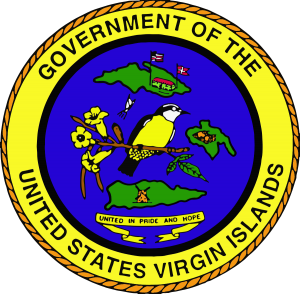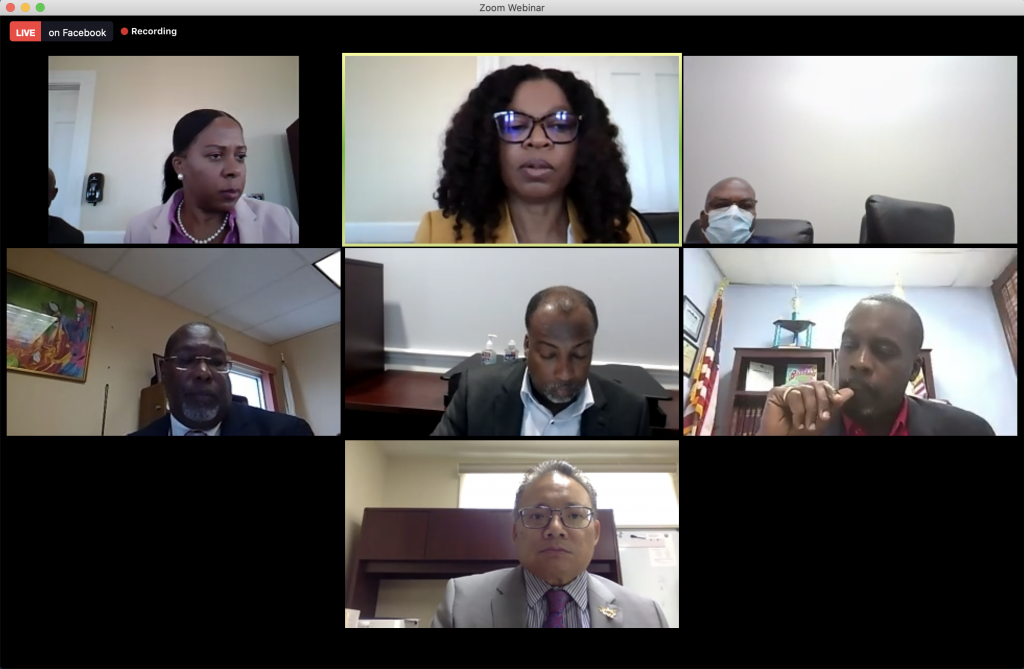U.S. VIRGIN ISLANDS — The Spring Revenue Estimating Conference for Fiscal Year 2020, which took place via a virtual meeting online on Tuesday, revealed the scope and impact that the COVID-19 pandemic has had so far on the Territory’s economy.
Once again, Governor Albert Bryan Jr. attended, and he heard how all of the revenue-generating agencies in his Administration have taken a hit from the virus.
The Office of Management and Budget (OMB) hosts the semi-annual conferences to keep track of the Territory’s budget revenues, and the virus pandemic was cause for significant readjustment of previous projections.
OMB Director Jenifer O’Neal, who moderated the conference, explained that the original revenue projection for 2020 revenue of $868,920,011 had to be adjusted to the current post-COVID revenue projection of $718,327,197 for the rest of FY 2020.
Consequently, the revenue projection for FY 2021 currently is $742,779,823. By comparison, the actual revenue from FY 2019 was $841,939,976.
The Virgin Islands Department of Tourism has been particularly hobbled by the lack of any cruise ships sailing until late summer or early fall and a struggling airline industry that has reduced the Territory’s airlift.
The necessary steps to stop the spread of COVID-19, such as social distancing and the stay-at-home-order, also adversely affected the Leisure/Hospitality sector, halting the recovery of the Territory’s hotels, some of which were still trying to reopen from the 2017 hurricanes.
According to Tourism Commissioner Joseph Boschulte, daily passenger arrivals into St. Thomas by air dropped from nearly 2,400 on March 14 to less than 100 by the end of March, and flights to St. Thomas from the mainland decreased from about 90 per week to 15 a week with flights operating nearly empty.
Consequently, Commissioner Boschulte said, Hotel Room Tax revenue will be significantly reduced for the year, and those collections dropped from $2,552,521 in March to $1,832,488 in April, a drop of about 28%.
Airlines continue to bring back service with increased frequency, though the number of flights to St. Thomas and St. Croix won’t get back near pre-COVID levels until late August and early September.
According to Dr. Mark Wenner, the chief economist at the Bureau of Economic Research, estimated that for the tourist expenditures will decrease by $273 million for the rest of Fiscal Year 2020 and tax revenue will be down $150.1 million from initial forecasts for the fiscal year.
Unemployment in the Territory doubled from March to April, rising from 4.2% to 8.4%, with the two largest decreases coming in the Retail and Leisure/Hospitality sectors.
According to Dr. Wenner, the Gross Domestic Product of the U.S. Virgin Islands is likely to contract 12% to 14%, and tax revenue from April 2019 to April 2020 is off by 15%.
The Territory’s outlook is fragile, according to the Bureau of Economic Research, and likely realities are that there will be negative real economic growth in the calendar year, even with the substantial federal stimulus funds.
Bureau of Internal Revenue Director Joel Lee said he expects decreases in revenue from individual income tax collections, corporate income tax collections and other tax collections, which include Hotel Occupancy Tax, Highway User’s Tax and the Fuel Tax.
However, Director Lee projects an uptick in Gross Receipts Tax, which has increased so far in FY 2020 by about $6.5 million over the same period in FY 2019.
Additionally, the Territory has seen $64 million in Excise Tax losses this fiscal year as of April 30, 2020.
Labor Commissioner Gary Molloy gave a snapshot of the enormous impact COVID-19 has had on the Territory’s workforce, and he offered COVID-19 has increased unemployment in the Territory, and he presented an outlook for the future of the workforce and the factors that will continue to affect it.
Between March 8 and May 31, the Virgin Islands Department of Labor received 6,292 unemployment claims, 1,711, or 27%, on St. Croix; 3,724, or 59%, on St. Thomas; 490, or 8%, on St. John; and 372, or 6%, interstate claims.
The department has issued $10,776,600 in Federal Pandemic Unemployment Compensation and $5,316,188 in regular unemployment insurance payments. The devastation COVID-19 has wreaked on the workforce is illustrated by the fact that the unemployed population increased by 67% from March to April this year.
Job losses were only in the economy’s private sector, with Leisure/Hospitality losing 1,485 jobs; Trade, Transportation and Utilities losing 971 jobs; Construction losing 220 jobs; Other Services losing 182 jobs; Education and Health Services losing 110 jobs; and Financial Activities losing 103 jobs.
Federal funding through the National Dislocated Worker Grant of $1.5 million can provide up to 80 jobs, with a maximum amount of $20,000 per participant, who will be limited to 2,080 total work hours in the sector of Disaster Relief and Humanitarian Employment.
Commissioner Molloy said some of the primary factors affecting the unemployed population’s ability to return to work include health and safety of the work environment; increased demand for automation and use of online platforms for communication; the external volatility of the Government Employees Retirement System; employer overhead and operating costs; child care and transportation concerns; family members affected by COVID-19 and quarantines; and an overall fear of being around others.
Two agencies, the Bureau of Motor Vehicles and the Department of Licensing and Consumer Affairs, projected revenue increases through the end of FY 2020 and beyond.
Bureau of Motor Vehicles Director Barbara McIntosh projected a steady increase in revenue through the collection of fees, and she estimated an uptick from $10,413,045 in 2019 to $10,680,724 for 2020 and increasing at a similar rate through 2023 as the bureau expands its online services.
DLCA Commissioner Richard Evangelista, whose agency generates revenue through fees and fines, said one of his initiatives is to raise citation fees by 15% and the DLCA Enforcement Division is prioritizing the collection of delinquent license fees and penalties since 2010, which he estimated is about $15 million.
DLCA also plans to change its fee schedule for retail business licenses, and businesses will be assessed based on the size/magnitude of their operation. Under the new schedule, small retailers will be charged the current cost of $130 for a license, while medium-size retailers will be charged $260 and large businesses will be charged $390. Additionally, DLCA plans a 15% increase in fees for all other licenses by the end of FY 2020 and an additional increase by 10% in 2022.
Other agencies that participated in Tuesday’s Revenue Estimating Conference were the Tax Assessor’s Office; the Department of Property and Procurement; the Department of Planning and Natural Resources; the Virgin Islands Housing Finance Authority; the Office of Disaster Recovery; the Virgin Islands Port Authority; the Department of Public Works; the V.I. Water and Power Authority; the Research and Technology Park; the Economic Development Authority, the Public Finance Authority; and the Department of Finance.

